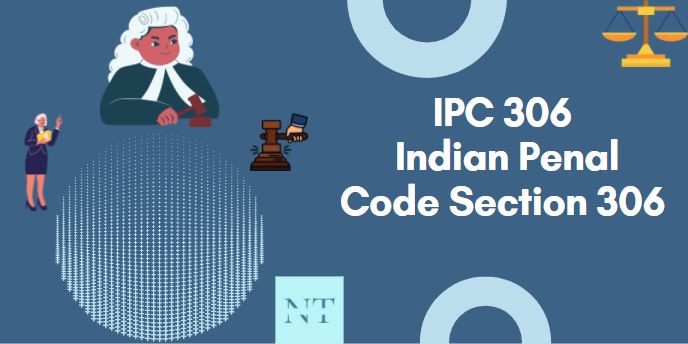IPC 306:As per section 306 of the Indian criminal code, any person has committed suicide, or who aids in the conduct of such suicide, is punishable by imprisonment of any kind for a time up to 10 years, as well as a fine.
Table of Contents
What is Said in Section 306 of Indian Penal Code?
Before going into other details, let’s first understand the meaning of “Abetment” and “Suicide”
The inducement of a person to perform (or not do) an act in a specific way, or help given by one person to another, whether on his own will or as a result of equal and constructive culpability, is referred to as abetment. Suicide abetment is a mental process that involves actively inciting or assisting a person in ending his or her own life.
The term “suicide” are not mentioned in the Code. Its essence and significance, on the other hand, are generally understood and require no justification. “Sui” means “self,” and “cide” means “killing,” meaning a suicide attempt. In other words, a person contemplating suicide must do it by himself, regardless of the tools he uses to accomplish his goal of killing himself.
Is section 306 IPC constitutionally valid?
The constitutionality of Section 306 was examined in Naresh Morotrao v Union of India, and the court determined that Section 306 comprises an altogether separate offence. It is based on the public policy premise that no one should participate in, initiate, or assist in the committing the offence. It is thus constitutionally valid since it complies with Articles 14 and 21 of the Constitution Of india.
Essential Elements
To get a valid sentence within this section, three conditions must be met:
First, the dead must have committed suicide – The dead should have committed suicide, meaning that he or she should have taken one’s own life (and not murdered by any other individual). Because just an unfulfilled effort to commit suicide isn’t really punished under this Section, the accused must complete the act in order to be found guilty.

Second, the accused within this section must have instigated or inspired him/her to perform such an act – The accused should just have aided or provoked the suicide of the dead victim.
Third, the accused’s claimed involvement must be direct – The accused’s claimed involvement in the dead victim’s suicide should be unequivocal.
What Amounts to Instigation?
An individual who instigates the other must provoke, incite, urge, or persuade the other to do something by “goading” or “urging onward.” “Instigation” as held in Ramesh Kumar v. State of Chhattisgarh, (2001) 9 SCC 618 is, if the accused sets such circumstances via his deeds or a continuing course of behaviour that the dead is left without any other alternative than to commit suicide.
In the case of instigation, various Supreme Court decisions have stated that there must be a live or close relationship between the conduct of aiding and abetting and the actual committing of suicide.
In Sanju Alias Sanjay Singh Sengar v. State of M.P. (2002) 5 SCC 371, this Court held that despite the fact that the dead was named in the suicide letter, the suicide was not directly adjacent to the quarrel and also that the suicide may not have been the direct consequence of the quarrel when such appellant was using insulting words and told the deceased “to go and die.”
Act Constituting Instigation
Harassing or Eve Teasing
In the case of Pawan Kumar v. State of Himachal Pradesh, (2017) 7 SCC 780, where the accused fell in love with a female and they both eloped. He was charged with violating Sections 363, 366, and 376 of the Indian Penal Code. However, understanding that she had been equally to blame, the girl stood by him all through the trial, resulting in his acquittal. However, after being acquitted, the accused began pestering her and took advantage of every chance. He threatened to abduct her and engaged in constant eve-teasing, leading the girl to believe that death was a better alternative than living, and she has been left with little choice but to commit herself. She doused herself with kerosene and set herself on fire, subsequently dying.
The Court found no evidence on the record to support the conclusion that the victim who committed suicide was sensitive to ordinary childishness, conflict, and difference in home life that were prevalent in the community whereby the victim belonged. But at the other side, the accused is alleged of actively destroying the victim’s self-esteem and self-respect, leading to the victim’s suicide. In reality, the brutality she has been subjected to has caused her to kill her living spark.
Insult
The Supreme Court held in M. Arjunan v. The State presented by Police that a conduct of insulting an individual by using harsh words does not necessarily entail the abetment of suicide.
Maltreatment of wife
Simple examples of husband-and-wife quarrels or proof that the applicant used to drink alcohol at times cannot be considered abetment pursuant to section 107 IPC, 1860. In these circumstances, it is impossible to say that the accused/appellant provoked or assisted the deceased in ending her life, and as a result, his conviction against section 306 IPC, 1860 is unjustified and should be overturned. This was held in the case of Sanjay Jain v State of MP, 2013 Cr LJ 668 (Chh).
In the matter of Jeevan Babu Desai v State of Maharashtra, 1992 Cr LJ 2996 (Bom) where the accused husband, an alcoholic, had a habit of abusing his wife, beating her and accusing her of unchastity. In a squabble, the wife lit herself on fire and died. The spouse and others sought to extinguish the flames. The accused’s murder conviction was overturned, and he was found guilty under section 306.
Extra-Marital Relationship
The act of creating circumstances for the sufferer to commit suicide has already been deemed abetment. The dead spouse was embarrassed by his wife’s acts of indulgence with the accused throughout this instance. The accused publicly discussed his relationship with the deceased’s wife. The accused’s cruel deeds prompted the dead to commit suicide. The accused was found guilty of aiding and abetting suicide as held in the case of Dammu Sreenu v State of AP, 2003 Cr LJ 2185 (AP).
Pressure for Streedhan
In K Prema S Rao v Yadla Srinivasa Rao, AIR 2003 SC 11, the accused was pressuring his wife to handover land to his name that she did receive from her father as part of her streedhan. He kept her letters hidden. She committed suicide as a result of these events. He was found guilty of cruelty under Section 498A of the Criminal Code. He was punished under section 306 r/w section 221, CrPC, 1973, based on the same evidence.
Abetment by Rape
In the case of Sudhakar v State of Maharashtra, AIR 2000 SC 2602, the Supreme Court considered the likelihood of such abetment, but no sentence was imposed because the rape occurrence itself could not have been proven. More than nearly five months after the event, the woman committed suicide. Her remarks could not be considered a deathbed declaration because no circumstances surrounding her death existed at the time. The filing of the FIR and the medical test were both delayed. There has been no proof that links the defendant to the crime. The reason for the suicide was not officially established.
Instigation from superior officers
In the case of Madan Mohan Singh v State of Gujarat, (2010) 8 SCC 628, the deceased worked at the Microwave Department as a driver. He had recently had bypass surgery for the heart a few days before the event, and his doctor had warned him not to undertake any demanding tasks. The accused was the deceased’s superior officer. When the dead failed to follow the accused’s commands, the accused grew enraged and threatened to punish him, fiercely reprimanding him for not adhering to him. The driver took his own life.
If a superior officer’s views on his subordinate’s job are considered aiding suicide, superior officers’ ability to do their tasks as senior workers will become nearly impossible.
The deceased’s wages were halted for a month as a result of the action taken against him. The Supreme Court ruled that there could not be a guilty mindset or criminal purpose to cause an individual to commit suicide based only on that count. This was held in the case of Vaijnath Kondiba Khandke v State of Maharashtra, AIR 2018 SC 2659.
Conclusion
Suicide aid or abetment, whether by inciting the sufferer to commit suicide or assisting the victim in committing suicide because the scope of the rule is confined to only three main categories, the accused can simply circumvent the criminal laws dealing with such offences. As a result, it is necessary that the rules dealing with the charge of abetment be amended in such a way that offenders are unable to avoid the laws, change cases to fit their own needs, and escape punishment.
Furthermore, the laws must be read in a broad sense rather than a narrow one. But, each case must be judged on its own totality of the circumstances in order for justice to triumph. The existing abetment definition is inadequate. The section includes help, incitement, and conspiracy, however there are times when a person’s acts may not technically fall into these three main categories but still pressurize a people to commit suicide.
References:
- https://ncrb.gov.in/sites/default/files/glossary_7.pdf
- Gaur, K.D. Text Book On Indian Penal Code, 4th edition, Universal Law Publishing Co. Pvt. Ltd.(2012)
- Indian Penal Code , 1860, No. 45
Suggested Reading:
| Go To Sundarban News Today’s Home Page | Click Here |
| Go To Supreme Court’s Judgement | Click Here |
| Article Category | Legal Guide |
